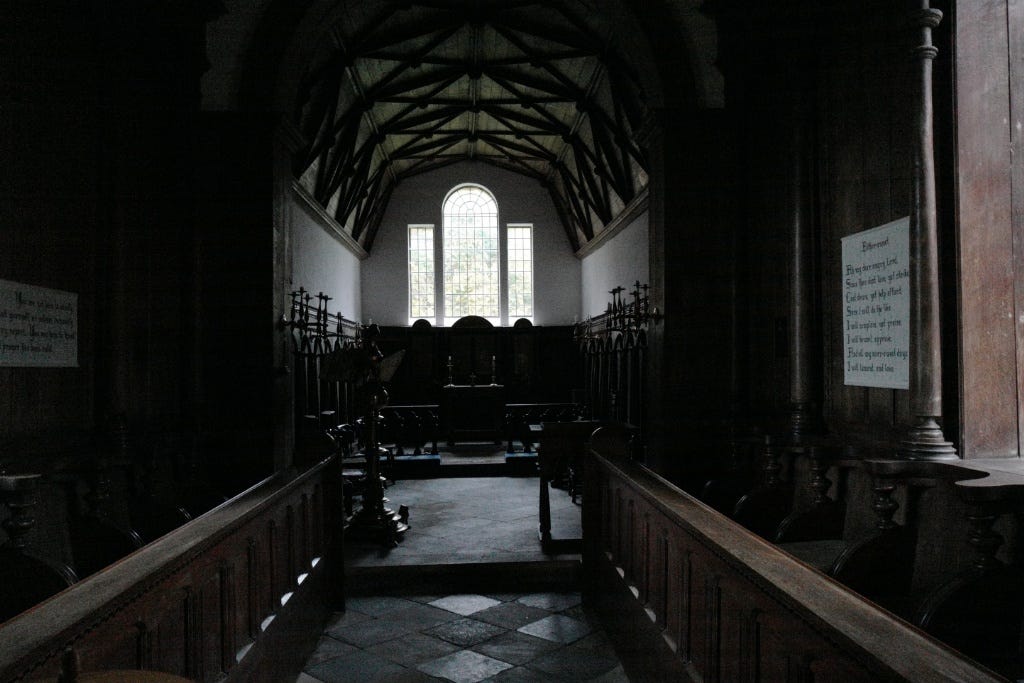Tuesday 16 November, 2021
Little Gidding
Last Sunday morning I watched a televised conversation between Andrew Marr and the actor Ralph Fiennes, who is currently engaged in an amazing theatrical experiment — doing TS Eliot’s Four Quartets, his last great poem, as a combination of Shakespearean soliloquy and an intimate monologue. (Arifa Akbar has a nice review of it in the Observer.)
Towards the end of the conversation, Marr asked Fiennes to read a piece from Little Gidding, the last of the four poems that make up the set. It was spellbinding to watch and listen to him. And a reminder of what an amazing gift actors have of bringing text to life.
And so on the spur of the moment, I decided to get into the car and drive to Little Gidding, a tiny hamlet about 45 minutes’ drive away. I’d often seen signs to it when driving up the A1 and made the kind of mental notes one makes but never follow up. So this was a nice way of making amends.
We drove along country roads of decreasing width and eventually came to the sign. We turned onto a narrow straight road which was marked as a dead end (somehow appropriate for Eliot, I thought) and eventually came to a beautiful spot with one large house and a few smaller dwellings. And a tiny church set in what appeared to be the garden of the large (but currently apparently deserted) house. There was nobody around — although there were some cars parked near the smaller dwellings.
Somewhat to our surprise, the church was open, but as it was towards the end of a November day, it was pretty dark. But it was also extraordinarily peaceful. If you wanted to retreat from the world, this would be a pretty good place to do it.
And then I took out my phone and found the text of the poem, and read this:
If you came this way,
Taking any route, starting from anywhere,
At any time or at any season,
It would always be the same: you would have to put off
Sense and notion. You are not here to verify,
Instruct yourself, or inform curiosity
Or carry report. You are here to kneel
Where prayer has been valid. And prayer is more
Than an order of words, the conscious occupation
Of the praying mind, or the sound of the voice praying.
And what the dead had no speech for, when living,
They can tell you, being dead: the communication
Of the dead is tongued with fire
Beyond the language of the living.
Here, the intersection of the timeless moment
Is England and nowhere. Never and always.
Quote of the Day
”However conservatism might be defined, placing the free market at its centre has been self-defeating. Margaret Thatcher’s political outlook was a blend of Burkean traditionalism with Hayekian libertarianism, a highly combustible mix. Unleashing the anarchic energy of free markets dissolves any social order that is based on traditional notions of duty and responsibility. Choice trumps other values, and everything is for sale. The result has been a culture of narcissism and the commodification of anti-capitalism. It is probably only an oversight on the part of their PR team that the Kardashians have not been marketed as daily readers of Karl Marx.”
John Gray, writing in last week’s New Statesman
Musical alternative to the morning’s radio news
Händel | Lascia Ch’io Pianga (from Rinaldo) | Michael Rieber (double bass) and Götz Schumacher (piano)
This is the first instrumental version of the aria I’ve ever heard.
Long Read of the Day
How Does Britain Maintain Relevance in a Changing World?
With difficulty, I’d say. Terrific, perceptive essay by Tim Marshall on the Political Future of Post-Brexit England.
This is how it opens:
Britain’s instinct post-2016 has been to look to the United States. Given America’s continuing political and economic power, this makes sense; but there are now differences to the 20th-century rationales for doing so. In the Cold War, it wasn’t just politically unacceptable to do major trade deals with Russia, it was of limited economic value. But this is not the case with 21st-century China, which, along with the EU and the US, is one of the three modern entities with massive purchasing power. So another hybrid strategy will be required, one that sticks with Washington, but somehow leaves the door open for good political and economic relations with Beijing. It will be, as the diplomats in the Foreign Office like to say, by way of understatement, “challenging.” However, a clear indication of what the British believe to be their best option was seen in the summer of 2021 when its new aircraft carrier, the HMS Queen Elizabeth, was dispatched to the South China Sea with ten US Marine Corps F-35 jets on board.
Don’t you just love that word — “challenging”?
Seán Quinn, the Streisand Effect, and improving the operation of the right to be forgotten
Very interesting blog post by Eoin O’Dell (Whom God Preserve), a distinguished Irish legal scholar, on the flaws in the so-called ‘Right to Be Forgotten’ (RTBF).
Before you embark on it, it might be helpful to know a bit about the Quinn family which features in the story. The Wikipedia page on Seán Quinn, once allegedly the richest man in Ireland, is helpful in that context.
Footnote: The RTBF is a misnomer as the material of which a petitioner complains remains published on the Web. It’s just the right to have Google exclude that article or articles from its Search engine. Perhaps it should be known as The Right to be ‘Disappeared’, since in a comprehensively networked world if the dominant search engine can’t (i.e. won’t) find you then you have been ‘disappeared’ as Pinochet & Co used to put it.
A commonplace booklet
Airless tyres
Now here’s a really good idea.
Made by Michelin, it combines an aluminum wheel with a special “tyre” around it. Made with a plastic matrix laced with — and reinforced by — glass fibres. The company claims to be hoping to have them on the market by 2024.





